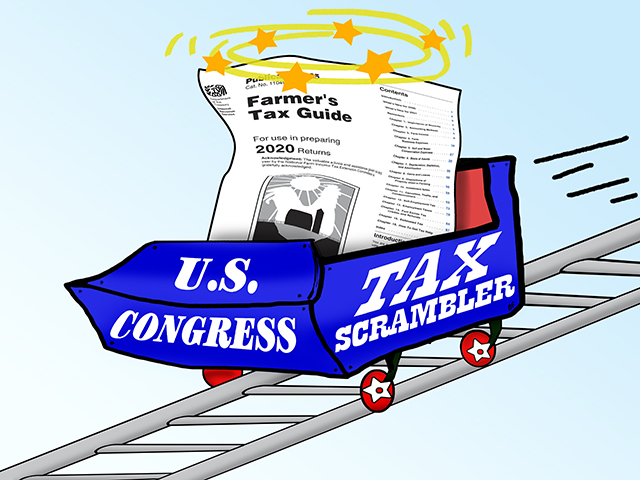Taxlink
Stop the Tax Roller Coaster
As we work through an extended tax season, I wanted to throw out a few thoughts on 2021. To say it's been a wild ride is an understatement.
We have numerous last-minute changes to the 2020 tax law that impact tax returns. It seems like every day, we see more spending and more taxes coming from Congress.
It's hard enough to farm, even harder when Congress keeps changing the rules.
Let's go over a few tax items you should be aware of.
-- Congress passed the American Rescue Plan Act of 2021 (ARP). The ARP Act benefits farmers who participate in Affordable Care Act Marketplace insurance.
With good crop yields and prices in 2020, many farmers had income in excess of the threshold, which would have required them to pay back the subsidy. Under the ARP Act, farmers have one-time relief. No payment is required in 2020 if your adjusted gross income triggered repayment of the subsidy.
P[L1] D[0x0] M[300x250] OOP[F] ADUNIT[] T[]
For those who missed this, don't rush to file an amended return. The IRS may recalculate your return and refund the repayment. The ARP Act also allows those with income greater than 400% poverty level to participate in Marketplace insurance in 2021 and 2022.
It may be beneficial to look into Marketplace health insurance.
-- The Employee Retention Credit has been extended through Dec. 31, 2020. You are potentially eligible if you can show a reduction in gross receipts for any quarter in 2020 compared to 2019.
-- Families First Coronavirus Response Act was extended through Sept. 30, 2021. If an employee is unable to work for various COVID-19-related reasons, the employer can claim a credit.
There have been some concerning tax and economic issues that may be coming around the corner. Many farmers have seen a significant increase in the cost of lumber and steel. This has added significant cost to building projects such as barns and grain bins.
We are also noticing an increase in input costs. Many farmers only focus on commodity prices -- maybe the strategy should be looking at the expense side.
The most concerning thing, in my opinion, is Congress is making a serious push to institute a wealth tax.
Democratic Sens. Chris Van Hollen, Md., Cory Booker, N.J., Bernie Sanders, Vt., Sheldon Whitehouse, R.I., and Elizabeth Warren, Mass., introduced the Sensible Taxation and Equity Promotion Act (STEP). The STEP Act calls for a tax on property transfers during lifetime (gifts) or death if there is a net capital gain associated with the transfer. During life, the first $100,000 of cumulative gain would be tax-free (transfer other than to spouse). At death, the first $1 million of unrealized capital gain would be excluded and the rest subject to tax. For those with illiquid assets such as farms, you can pay the tax over a 15-year period.
As Bernie Sanders said, "It is absurd that our tax code allows many of our country's wealthiest people to get away with never paying a cent in taxes on millions or even billions in capital gains income, while working people pay taxes on every check they receive." I guess most of my farm clients aren't "working people."
**
-- DTN Tax Columnist Rod Mauszycki, J.D., MBT, is a tax principal with CLA (CliftonLarsonAllen) in Minneapolis, Minnesota.
-- Read Rod's "Ask the Taxman" column at about.dtnpf.com/tax.
-- You may email Rod at taxman@dtn.com.
[PF_0521]
(c) Copyright 2021 DTN, LLC. All rights reserved.




